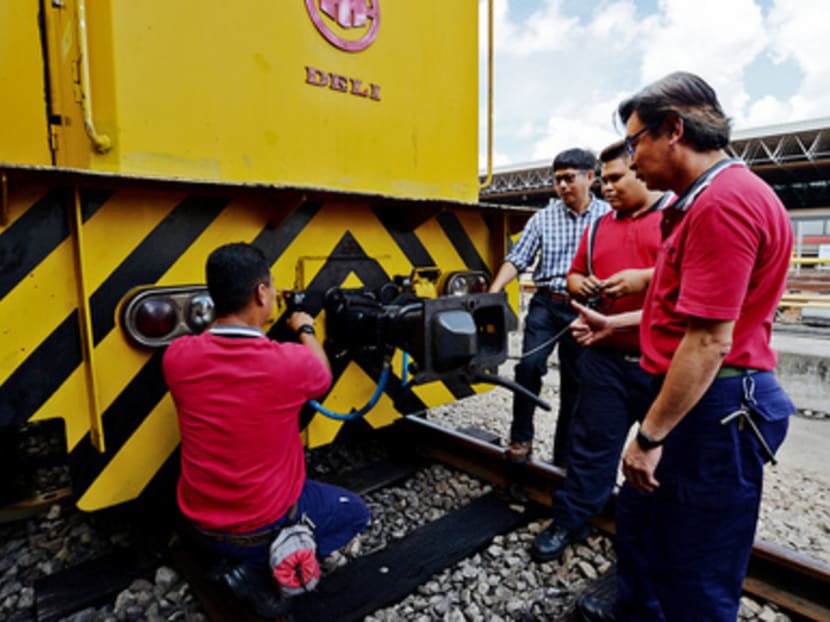SMRT, SBS unveil training, career-development plans
SINGAPORE — Public transport operator SMRT, which has been plagued in recent years by train breakdowns and service reliability issues, is ramping up training for its rail engineers and enhancing career options within the company to attract and retain talent.

SMRT senior principal engineer Abdul Rashid Ahmad (in blue) feels the operator’s new framework would make progress up the career ladder smoother. Photo: Robin Choo
SINGAPORE — Public transport operator SMRT, which has been plagued in recent years by train breakdowns and service reliability issues, is ramping up training for its rail engineers and enhancing career options within the company to attract and retain talent.
The firm’s trains division, which has pledged to boost its talent pool to better maintain and upgrade an ageing rail network, will require engineers who have served with SMRT for at least five years to undergo a three-month training programme that covers both technical and management aspects. Newer staff will need to join a two-and-a-half-month Step-In programme.
SBS Transit, the other train operator here, yesterday also announced a remodelled career-advancement structure for staff, under which job titles for engineers would be changed to reflect their specialisation instead of only their corporate rank, as well as more support for staff training.
SMRT Trains Deputy Director of Human Resources Alvin Tan called its efforts part of a move to drive competency and thus ensure reliability of service, adding that it plans to increase the number of engineers in its employ from 288 to 355 over the next two years.
In a press conference on Wednesday, SMRT Trains managing director Lee Ling Wee said the new framework — which also maps out career paths for its engineers — provides more structure. “In the past, advancement was granted on a more ad-hoc basis — it was dependent on individuals, time and space,” he said.
SMRT operates the North-South, East-West and Circle Lines, as well as the Bukit Panjang LRT network. Following a series of service breakdowns earlier this year, the operator said it would bring forward plans for improving service reliability, including setting up a centralised maintenance operations centre and introducing a mobile operations maintenance system that will allow field engineers to address technical issues on the go.
Commenting on the revamped training framework, Mr Lee said it gives engineers more mobility within the organisation. They can develop their careers along a purely engineering track, move into management, or do both. This could help make careers with SMRT more attractive to engineers, he said.
Mr Abdul Rashid Ahmad, 53, who started his career at SMRT as a technician in 1993, moved up the ranks within the company over 20 years, and is now a senior principal engineer and branch manager. He feels the new structure would facilitate his progress up the career ladder. “I have been pulled into different departments and each time I joined a new department, it was tough.”
Meanwhile, SBS’ plan for supporting career development includes more help for engineers to attain Chartered Engineer accreditation with the Institution of Engineers Singapore (IES).
The institute grants Chartered Engineer accreditation for several disciplines in engineering and has added railway and transportation to the list.
An SBS spokesperson said the company would grant study leave and sponsor-related fees to any of its engineers who want to be accredited, adding that the plan is to have between five and 10 engineers becoming chartered engineers every year over the next five years. The operator, which manages the North-East and Downtown MRT lines, as well as the Sengkang and Punggol LRT network, currently has more than 200 engineers in its employment. It expects to recruit another 100 by 2020.






